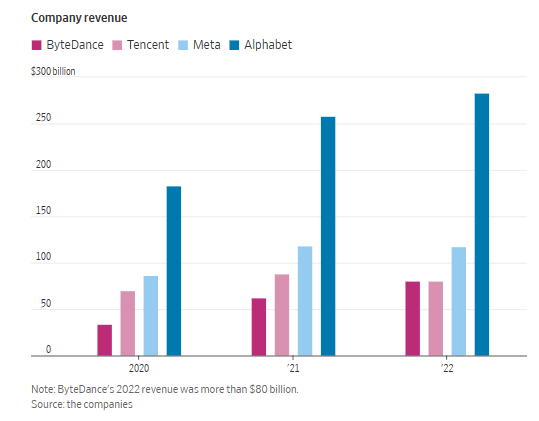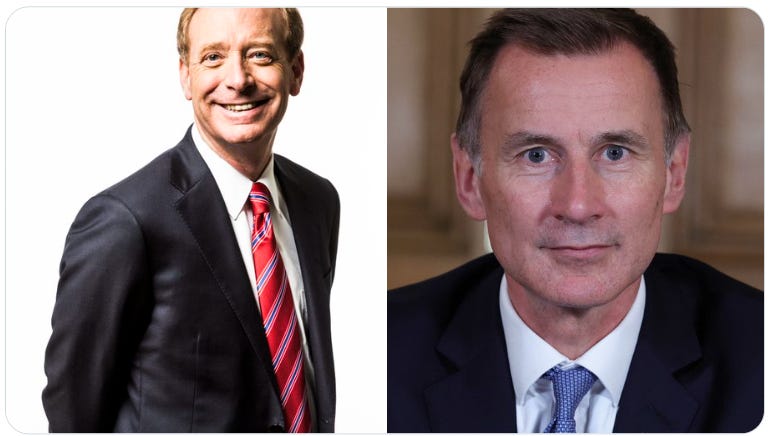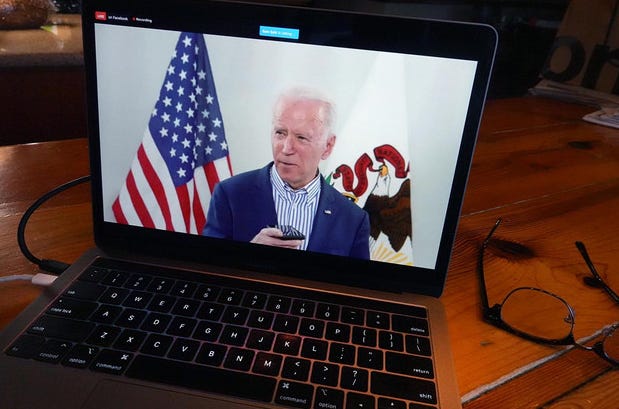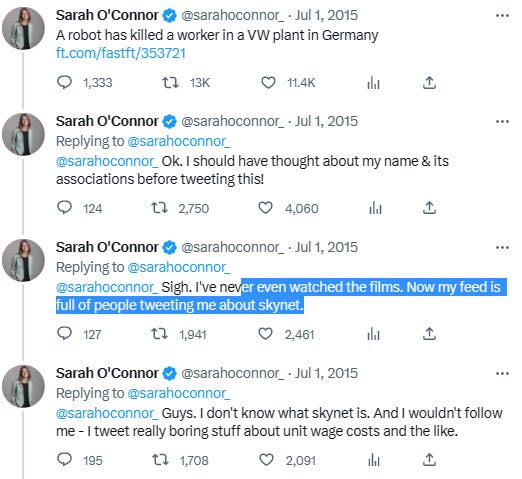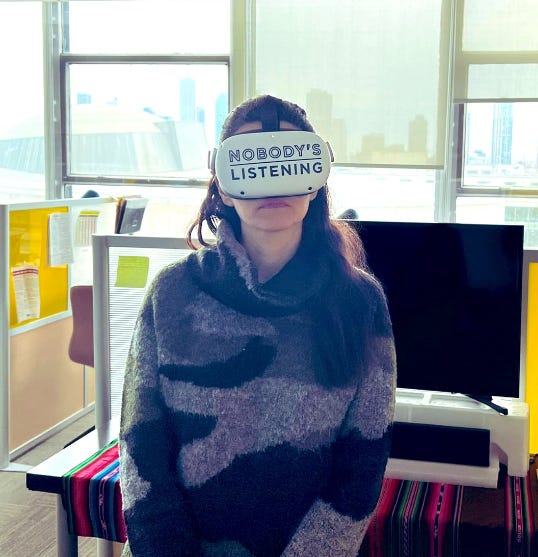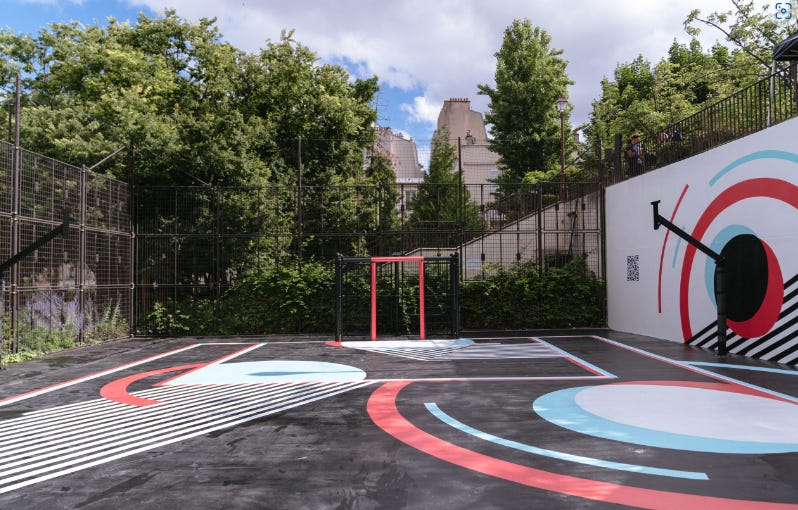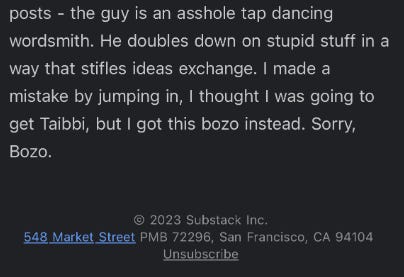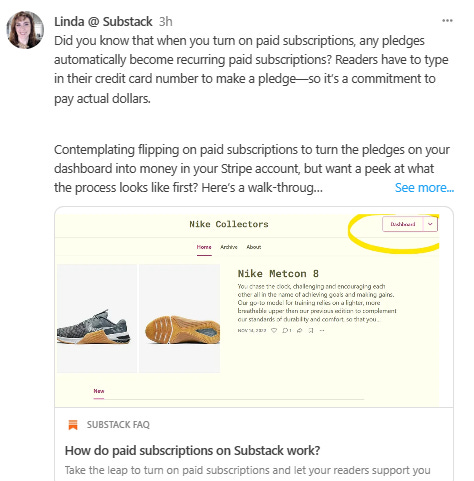Booming about ChatGPT and Artificial Intelligence can't be stopped. Biden Administration after the CHIPS Act was in a hurry to make “made in America” chip, semiconductor, no longer reliant on (especially) China. Today, Google CEO Sundar Pichai says its ChatGPT rival is coming soon as a ‘companion’ to search. 2023 (momentum that) The great stagnation is over (AI, bio, fusion, electric cars), long live the great stagnation (housing, college, transit, crime, healthcare, mobility).
Google will make AI-based large language models like LaMDA available “in the coming weeks and months”. Google invests $300 million in Anthropic as the race to compete with ChatGPT heats up.
Anthropic was founded in 2021 by the team behind AI breakthroughs such as GPT-3 and Reinforcement Learning from Human Feedback (RLHF). Anthropic is focused on developing and deploying Claude, an AI assistant based on the company's research into building safe, steerable AI. Anthropic has created safety techniques like Constitutional AI to create AI technologies that are easier to rely on and understand. OpenAI just released a new model to distinguish between AI/human written text to protect against ChatGPT. The classifier was trained on a pair of AI/human written dataset.
GlassAI launched an LLM-based tool capable of generating a diagnosis or clinical plan based on symptoms. Also, ChatGPT recently passed the US Medical Licensing Exam.
Still imperfect, yes of course. It's very concerning that ChatGPT is biased. Give it enough time and it can skew the world's opinion on a few topics, especially political ones. It's much safer to trim it down and prevent certain words to be used as prompts. I'd rather have fewer topics than many biased ones.
For such a massive company, the speed with which Microsoft shipped GPT integration into Teams (install base of ~270m active users) is insane. This is going to destroy Zoom, Slack, etc. Satya really is amazing. The simple interface with the most magical AI underneath that you have created, is simply the absolute chucking best, thanks for building what you have with chatGPT. The same $1B today will cost $1M in 2033… meaning in 10 years AI models will generate 1,000+ times what they can today.
But seismic, setback, abruptly happens in internal of White House
Alondra Nelson, who served as the first woman of color to lead the White House Office of Science and Technology Policy earlier in the Biden administration, is set to step down from her current post as a deputy director at OSTP on February 10, she told Axios exclusively in an interview.
Driving the news: Nelson is leaving the White House after two years to return to the Institute for Advanced Study in Princeton, N.J.
Nelson led the OSTP Science and Society team, which had been newly created under Biden, and led all of OSTP for eight months after Eric Lander resigned last February.
What they're saying: "We have landed some really big planes over these two years, and we're in really good shape," she said. "It's a good moment to step away with some work launched that's on the way to becoming implemented, and leave that work for others to do."
"Alondra Nelson stepped in to lead U.S. science and technology policy at a key moment, and she delivered," Biden deputy chief of staff Bruce Reed told Axios. "She has been a critical voice on equity, civil rights, and opportunity for all Americans. Her impact in this White House will far outlast her time in this building."
The big picture: Nelson led work on artificial intelligence, in addition to rolling out more rigorous scientific research for developing federal policies, making publicly funded research available to the public and boosting STEM programs.
Details: Nelson's team was behind the Blueprint for an AI Bill of Rights, which laid out principles for design, use and deployment of automated systems, focusing on principles including fighting algorithmic discrimination, data privacy, notice and explanation of how systems work and the right to human alternatives.
"The space of automated systems and AI policy moves very quickly, and we really can't be on the sidelines," she said. The popularity of ChatGPT and other generative AI programs being available to the public "is probably going to be a real shift in how people engage with technology and their day-to-day lives."
The big picture: AI is still unregulated at a federal level at a time of rapid advancement, and there's only so much the White House can push forward in the absence of federal laws.
Nelson said the ultimate hope is for Congress to pass laws governing AI, but that the country "is in a stronger place than we were two years ago."
As AI systems becomes more prevalent, Nelson said there are big questions around the sources of AI's data and whether it's representative: "Part of how we restore trust in government and engender trust in new and emerging technologies is being able to be honest with the American public about the upsides and the downsides," she said.
Zoom out: Nelson said it was important for her as the first woman of color to lead OSTP to include "all of the communities you need to be at the table in the innovation space," since historically, the world of science and technology policy has often left out women and people of color.
Nelson said she thinks her perspective "helped marginalized communities... more deeply invest and believe in the power of democracy and innovation."
Alondra Nelson departed at nearly the same moment when TikTok tried to (re)launch a campaign to win back American people, after get banned in several states.
Millions spent on lobbyists, a billion spent on safeguards. Will it be enough to stay in the United States?
The act of scrolling through your For You feed on TikTok might come with an additional sense of impending doom these days. After years of hand-wringing over the enormously popular app’s ties to China and the potential national security threat they present, it looks like someone is going to do something about it.
TikTok is grappling with an increasingly real prospect of being banned in the United States. This wouldn’t just be a mostly performative prohibition of installing the app on federal or state government-owned devices. It could also be more impactful than the legally questionable ban that former President Donald Trump tried and failed to enact in 2020. The growing clamor in Congress to completely ban TikTok in the US raises the stakes for the Biden administration, which is in the late stages of reviewing the security risks of the popular social media app.
The ban TikTok is now facing would forbid its China-based parent company, ByteDance, from doing business in the United States, which would block Apple and Google from hosting the TikTok app in their app stores. It wouldn’t make it illegal for you, the consumer, to use TikTok. It would just make it much harder to do so. And even if that ban doesn’t happen, there’s increasing pressure on Apple and Google to impose their own bans and boot TikTok from their stores, with one senator now asking them to do so.
Banning an app is more the provenance of countries like, well, China, which has banned a number of American apps and websites, including Facebook, Instagram, YouTube, and Twitter. It’s also not certain that the US government actually would take such a huge step. But you’ve surely heard that it could happen, and you’re probably wondering if and how it would — or even why it’s necessary.
Seemingly every Big Tech company is facing unprecedented levels of scrutiny these days, but TikTok faces opposition that its peers don’t. At a time when US-Chinese relations aren’t great, TikTok’s popularity is a threat to America’s technological superiority, especially when it comes to the internet. But US lawmakers are much more likely to point to the perceived threat to national security, believing that the Chinese government is using the app to spy on Americans and push harmful content onto them through the app’s powerful yet mysterious For You recommendation algorithm.
To deal with these conflicts, ByteDance has spent over three years negotiating with the Committee on Foreign Investment in the United States, or CFIUS, an inter-agency group that reviews transactions involving foreign parties for national security threats. ByteDance hopes to reach an agreement that would allow TikTok to continue to do business here while minimizing the chances of interference from the Chinese government. While ByteDance says there is a draft agreement with CFIUS, it still hasn’t been finalized. It didn’t help matters when, in the last days of 2022, ByteDance had to admit that some of its employees improperly accessed US citizens’ TikTok data as part of an investigation into leaks to journalists.
ByteDance is spending a lot of money trying to convince detractors that it doesn’t take marching orders from China and that it wouldn’t give the Chinese government US user data or influence US users. The company has spent millions building up and expanding its Washington, DC, presence, and more than $1 billion on “Project Texas,” an effort to rebuild the app on US servers in order to wall it off from ByteDance and China as much as possible, while also promising several layers of independent oversight and transparency.
Accordingly, TikTok is getting more aggressive about making Project Texas’s case to politicians, public interest groups, academics, and the media after years of lying low and quietly trying to work out a deal that CFIUS still has yet to officially agree to. The company briefed think tanks in late January, and gave journalists (including Recode) a tour of its new Transparency and Accountability center in February. TikTok’s lobbyists have also “swarmed” lawmakers’ offices, and the company is currently hiring several people for communications and policy positions on a state and federal level, according to the New York Times.
“We are confident that the proposal under consideration by CFIUS will fully satisfy US national security concerns,” TikTok spokesperson Brooke Oberwetter told Recode.
It looks like 2023 will finally be the year when we find out if ByteDance can convince an increasingly hostile audience that TikTok isn’t a national security threat — or what happens to TikTok if it can’t.
The only thing that may have grown faster than TikTok’s popularity in the US is the company’s DC presence. ByteDance spent just $270,000 on federal lobbyists in 2019, a year when TikTok agreed to a settlement with the FTC over children’s privacy law violations for a then-record fine of $5.7 million and when lawmakers started to raise concerns over its ties to China. In August of the next year, Trump issued his executive order proclaiming TikTok to be a national security threat and, using the International Emergency Economic Powers Act, ordering it to be sold to an American company or banned within 45 days. This obviously didn’t happen: President Joe Biden eventually rescinded the order, which was controversial to say the least, leaving it to CFIUS to make a deal with ByteDance.
TikTok has doubled down on its lobbying efforts in the meantime. ByteDance and TikTok spent $2.61 million on federal lobbyists in 2020, hiring people with connections to Republican and Democratic lawmakers alike (some were former lawmakers themselves). That spending nearly doubled to $5.18 million in 2021, and grew again to about $5.5 million in 2022, according to publicly available data. In late 2021, TikTok signed a lease for its first DC office. In April 2022, it grabbed an additional floor. That October, it hired Jamal Brown, who was the press secretary for Biden’s presidential campaign and then the deputy press secretary for the Pentagon, as a policy communications director.
“This is kind of the template for how modern tech lobbying goes,” said Dan Auble, senior researcher at Open Secrets, which tracks lobbyist spending. “These companies come on the scene and suddenly start spending substantial amounts of money. And ByteDance has certainly done that.”
While ByteDance has spent a lot on federal lobbying, some of its peers — Meta and Amazon, for instance — still spend a lot more. Meta, for instance, spent over $19.15 million on lobbying in 2022, and Amazon spent $21.38 million. Far more of ByteDance’s money has gone into Project Texas. In its effort to convince regulators that its app is walled off from China and ByteDance, TikTok partnered with Texas-based company Oracle, which is hosting US user data on and running traffic through its cloud infrastructure as well as reviewing the source code for TikTok’s recommendation algorithm and content moderation tools. Access to data and other parts of TikTok will be strictly limited to only essential personnel, and both Oracle and the US government will have some oversight.
This includes a new division called US Data Security, which was established last July. According to people present at the January briefing from TikTok in Washington that explained the unit, USDS will have 2,500 employees, which is reportedly half of TikTok’s US workers. It houses the people and processes that access US user data and moderate content shown to US users. Any USDS employee has to meet certain requirements set by the US government to avoid the possibility that they can or will be unduly influenced by the Chinese government — for example, they must be a US citizen or have a green card. The USDS reports to a board of directors that CFIUS will vet and approve. And that board then reports to CFIUS, not TikTok or ByteDance.
In November 2022, TikTok has continued its trend of scooping up American influencers by hiring a former high-ranking US-Government staffer.
The Chinese-owned social media company has hired Jamal Brown, President Biden’s former campaign national press secretary. The former Deputy Spokesperson for the Department of Defense will be operating in a diplomatic role for the tech giant, he will ‘manage policy communications’ for the United States and the Americas.
TikTok’s Oberwetter said this solution is “under consideration” by CFIUS and that the company believes it’s a “comprehensive package of measures with layers of government and independent oversight to address concerns about TikTok content recommendation and access to US user data, and to ensure that the TikTok software is operating as intended and is free of backdoors that could be used to manipulate the platform.”
On paper, these measures seem like they’d do enough to satisfy CFIUS, which was reportedly very close to finalizing the agreement several months ago. Samm Sacks, a senior fellow at Yale Law School’s Paul Tsai China Center, said the deal seemed to be structured around not trusting China or even ByteDance at all, and building a “set of robust protections” around that.
“For all of the complaints about the [national security] threat, there is a solution that would address it, and you don’t have to take TikTok’s word for it,” Sacks said. “[Project Texas] turns the keys over to somebody else.” (Sacks was present for TikTok’s recent briefing, but spoke to Recode before it.)
It’s not clear when or even if CFIUS will officially sign off on the plan. In lieu of an agreement, TikTok has delayed its plan to hire consultants who are supposed to monitor its operations and report back to the US government. That’s not a great sign that a deal is imminent, even as TikTok insists that it would satisfy all of CFIUS’s concerns.
What’s holding up the federal government? Politics, mostly. For some lawmakers and security officials, there may be nothing ByteDance and TikTok can do to convince them that the app isn’t an arm of the Chinese Communist Party. The lack of trust is understandable. For years, TikTok has been dogged by reports that it isn’t as independent of ByteDance or China as it wants the public to believe. Then, the late December revelation that ByteDance employees accessed TikTok user data to track US-based journalists couldn’t have come at a worse time. It was just the sort of incident lawmakers and agency officials suspicious of ByteDance and TikTok needed to make their case that the app couldn’t be trusted under any circumstance.
TikTok says the matter was an “egregious misuse” of user data by a few employees who violated company policy and are no longer employed there. It claims that the security controls Project Texas is implementing would have prevented this from happening in the first place, since ByteDance employees would not have been able to access that data.
It’s worth pointing out that ByteDance isn’t the first tech company to spy on journalists. As Forbes noted in its piece revealing what ByteDance had done, Uber and Facebook have been accused of similar actions over the years, and Microsoft searched a French blogger’s Hotmail account in 2012 to find out which Microsoft employee was sending him trade secrets. None of those services faced a potential nationwide ban over it, but none of them were owned by a Chinese company, either.
That leaves us with a few ways this could all play out. The most likely is that the CFIUS deal finally goes through. Biden could always pull a Trump and suddenly put out an executive order banning the app, but that’s not likely. It didn’t work when Trump tried it, and Biden isn’t as outwardly hostile to TikTok as his predecessor was. He’s invited TikTok creators to the White House several times, and a nonprofit associated with the Biden administration even has an official TikTok account, which was posting videos touting Biden’s accomplishments as recently as last November.
Not everyone’s counting on CFIUS. Sen. Mark Warner (D-VA), chair of the Senate Intelligence Committee, has expressed plenty of reservations about TikTok, and says he’s losing patience with CFIUS. If a deal can’t be reached, “Congress could soon be forced to step in,” he told Recode. Rather than a ban on just one app or company, however, Warner would like to see legislation that sets standards or rules for any app that falls under a set of criteria, including being owned by a company based in a country of concern. That would include TikTok, but it wouldn’t be limited to it, Warner’s office said.
In February, another member of the Intelligence Committee, Sen. Michael Bennet (D-CO), asked Apple and Google to remove TikTok from the app stores in a letter to the companies, again citing national security concerns and the app’s links to China. Last year, the Federal Communications Commission’s Brendan Carr, a Republican commissioner, sent a similar letter.
For some lawmakers, nothing short of a TikTok ban or forcing ByteDance to sell TikTok to an American company will do. Sen. Marco Rubio (R-FL) has been consistent about that for years, and now he’s joined by Rep. Raja Krishnamoorthi (D-IL) and Rep. Mike Gallagher (R-WI), chair of the House’s new select committee on China. Toward the end of the last session of Congress, they introduced the Averting the National Threat of Internet Surveillance, Oppressive Censorship and Influence, and Algorithmic Learning by the Chinese Communist Party Act, which called upon the president to use the International Emergency Economic Powers Act to ban TikTok, despite the fact that former President Trump’s attempt had met multiple legal roadblocks.
Gallagher’s office told Recode that he would support a sale to an American company as long as it included control over TikTok’s algorithm. Gallagher hopes to work across the aisle and with the Biden administration on this, and will be trying to set up a meeting with TikTok “in the coming weeks.” But the Congress member is not budging on his insistence that TikTok can’t operate here while it’s owned by a Chinese company.
“ByteDance must completely divest and there must be an end to Chinese ownership and control of the app,” Gallagher’s office said.
In late January, Sen. Josh Hawley (R-MO), another vocal longtime TikTok opponent, introduced yet another TikTok ban bill with Rep. Ken Buck (R-CO), the No TikTok on United States Devices Act. Just like Rubio’s bill, it directs the president to invoke the IEEPA to ban TikTok.
TikTok’s Oberwetter pointed out that banning one app won’t solve broader issues, such as data privacy, security, and harmful content. Legislation that regulates an industry rather than one company within it could kill two birds with one stone. Many bills have been introduced over the years that could do this. None of them have passed.
There are already “TikTok bans” in the US, but they’re very limited and chances are they don’t apply to you unless you’re a government worker or a massive fan of South Dakota’s tourism TikTok account, which was deleted as part of that state’s ban. The ban in the omnibus bill that passed at the end of 2022 and the bans that about half of all states have enacted so far only apply to government-issued devices.
If it came down to truly banning the app for the rest of the country, the most likely path would be to classify TikTok as a national security threat. The government has done this to other Chinese companies, like telecommunications equipment manufacturer Huawei. But banning the sales and use of hardware is more straightforward than an app, which is distributed over a global internet that’s notoriously impossible to regulate or control. And there’s no guarantee it would survive a court challenge.
“Courts do not view this type of legislation kindly, or did not when Trump proposed a similar ban. But that was three years ago and antagonism toward China has only increased in the intervening years,” said Sarah Kreps, director of Cornell University’s Tech Policy Institute.
And again, even if the federal government did ban Apple and Google from hosting TikTok in their app stores, there would probably still be ways to access the platform on the web or in alternate app stores (on Android devices, at least). It would be a lot harder, though, and that could discourage most users from trying.
TikTok has a few things going for it, too. With more than 100 million users in the US, there would surely be outrage if the government banned the app they love and spend hours on every day. TikTok’s user base might skew young, but a lot of them are old enough to vote. And they’re all able to write angry letters to or protest outside the offices of lawmakers who ban the fun video-sharing app they love. Not to mention the businesses that are increasingly relying on TikTok for their digital ad campaigns and might not be thrilled to see it taken away. Lawmakers and FBI directors might not have much use for TikTok, but millions of others do.
For all the money TikTok’s spending to make its case to DC, its most effective advocates might be the people it doesn’t pay at all.
==========END————
Thank you, as always, for reading. If you have anything like a spark file, or master thought list (spark file sounds so much cooler), let me know how you use it in the comments below.
If you enjoyed this post, please share it.
If a friend sent this to you, you could subscribe here 👇. All content is free, and paid subscriptions are voluntary.
————
-prada- is a Helper. Former adviser (President Indonesia) Jokowi for mapping 2-times election. I used to get paid to catch all these blunders—now I do it for free. Trying to work out what's going on, what happens next. Arch enemies of the tobacco industry, (still) survive after getting doxed.
(Very rare compliment and initiative pledge. Thank you. Yes, even a lot of people associated me PRAVDA, not part of MIUCCIA PRADA. I’m literally asshole on debate, since in college)
========
Thanks for reading Prada’s Newsletter. I was lured, inspired by someone writer, his post in LinkedIn months ago, “Currently after a routine daily writing newsletter in the last 10 years, my subscriber reaches 100,000. Maybe one of my subscribers is your boss.” After I get followed / subscribed by (literally) prominent AI and prominent Chief Product and Technology of mammoth global media (both: Sir, thank you so much), I try crafting more / better writing.
To get the ones who really appreciate your writing, and now prominent people appreciate my writing, priceless feeling. Prada ungated/no paywall every notes-but thank you for anyone open initiative pledge to me.
(Promoting to more engage in Substack) Seamless to listen to your favorite podcasts on Substack. You can buy a better headset to listen to a podcast here (GST DE352306207). Listeners on Apple Podcasts, Spotify, Overcast, or Pocket Casts simultaneously. podcasting can transform more of a conversation. Invite listeners to weigh in on episodes directly with you and with each other through discussion threads. At Substack, the process is to build with writers. Podcasts are an amazing feature of the Substack. I wish it had a feature to read the words we have written down without us having to do the speaking. Thanks for reading Prada’s Newsletter.





